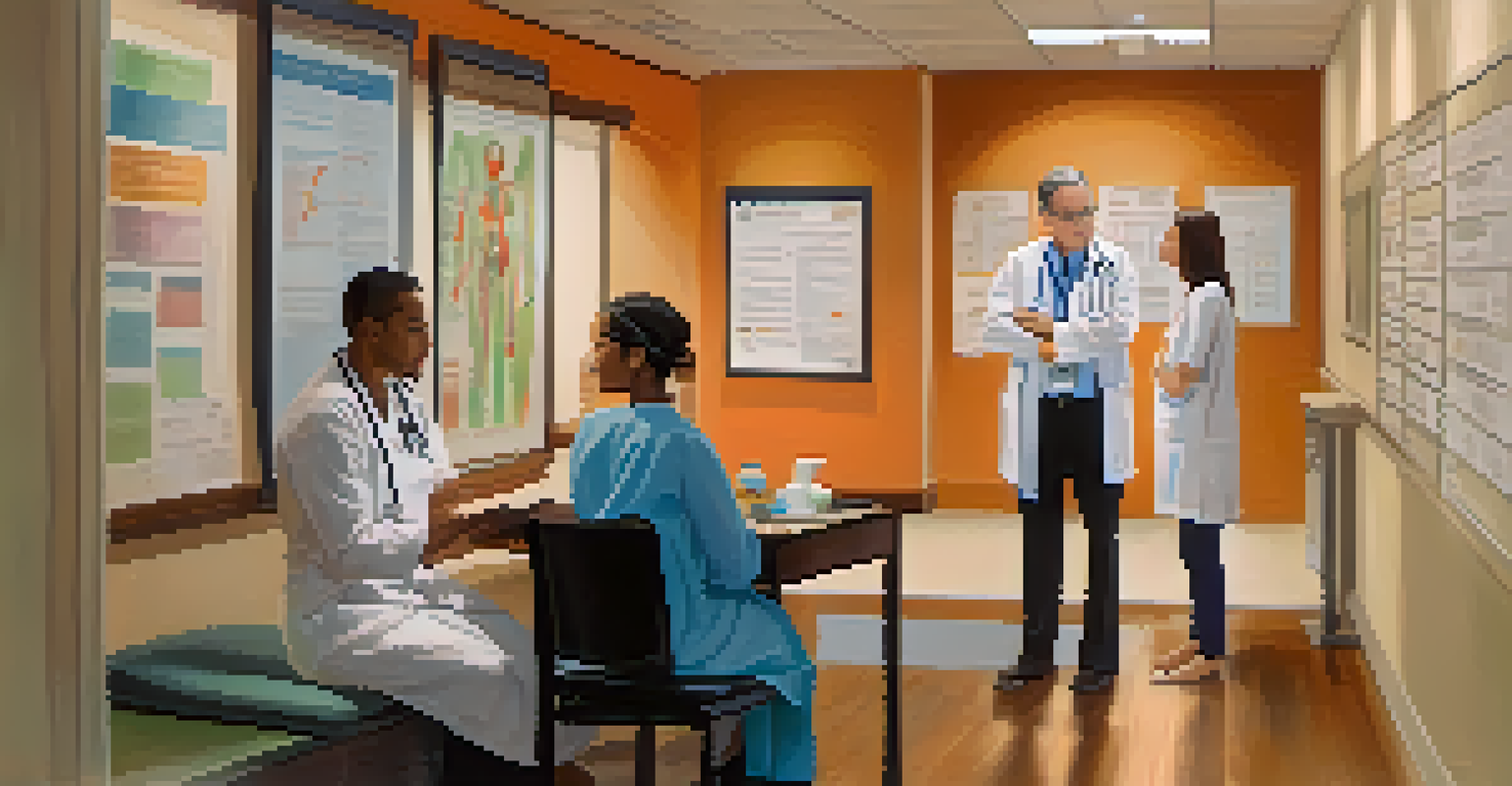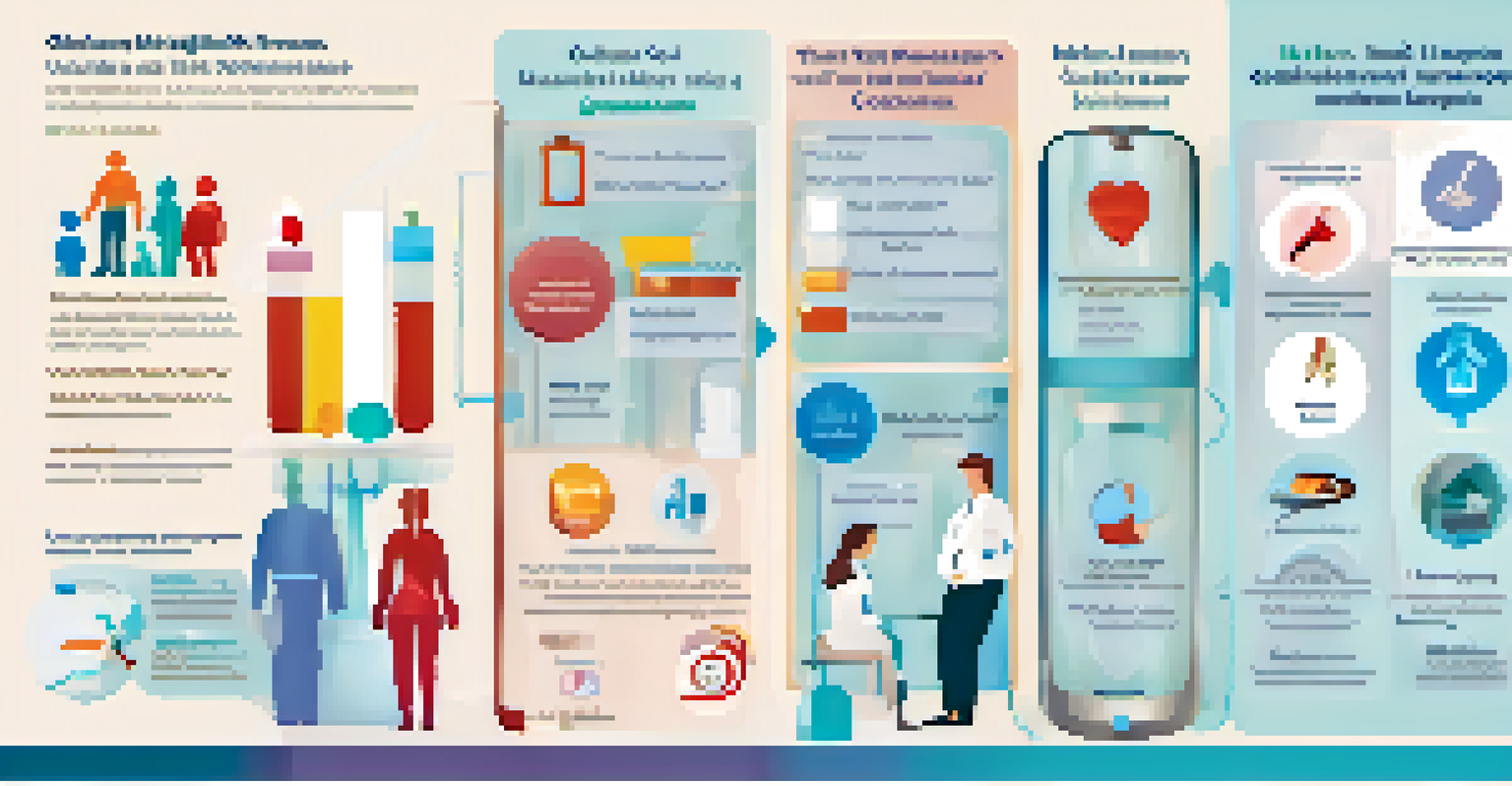Preventive Medicine: The Impact of Regular Health Screenings

Understanding Preventive Medicine and Its Benefits
Preventive medicine is all about keeping you healthy before issues arise. It focuses on disease prevention, early detection, and health education, making it a proactive approach to health care. By prioritizing regular health screenings, individuals can catch potential health problems early, which often leads to better outcomes and lower treatment costs.
An ounce of prevention is worth a pound of cure.
Consider it like maintaining your car: regular check-ups can identify small issues before they turn into major repairs. Similarly, health screenings can reveal risk factors or early stages of diseases such as diabetes or high blood pressure. This proactive approach not only saves lives but also promotes a better quality of life.
Moreover, preventive medicine encourages a healthier lifestyle overall. When people are aware of their health status, they are more likely to make informed decisions about diet, exercise, and other factors that contribute to their well-being.
The Role of Regular Health Screenings
Regular health screenings play a crucial role in preventive medicine. These screenings can include blood tests, mammograms, cholesterol checks, and more, depending on age and health history. Each of these tests serves as a tool to detect potential health issues before they become serious problems.

For instance, a simple blood test can reveal high cholesterol levels, prompting lifestyle changes that could prevent heart disease. Likewise, screenings for certain cancers, such as colon or breast cancer, can lead to early intervention, significantly improving survival rates.
Preventive Medicine Saves Lives
By focusing on early detection and health education, preventive medicine helps individuals catch potential health issues before they escalate.
The frequency and type of screenings can vary based on individual health risks, so it's essential to consult with healthcare providers to determine the best plan. Regular check-ups ensure that you stay on top of your health and make adjustments as necessary.
Common Health Screenings Everyone Should Consider
There are several key health screenings that are widely recommended for adults. These include blood pressure checks, cholesterol screenings, and diabetes tests, which are essential for monitoring cardiovascular health. Other important screenings include mammograms for breast cancer, Pap smears for cervical cancer, and colonoscopies for colorectal cancer.
The greatest wealth is health.
Each of these screenings is vital at various stages of life, and starting them at the right age can make all the difference. For example, women should begin mammograms at age 40, while colonoscopies are usually recommended starting at age 45. Early detection through these screenings can lead to less invasive treatments and better prognoses.
By adhering to recommended screening schedules, individuals can empower themselves to take charge of their health. Staying informed about which screenings are necessary can lead to timely interventions when health issues are detected.
Benefits of Early Detection and Intervention
One of the most significant advantages of regular health screenings is the opportunity for early detection. Many diseases and conditions, when caught early, can be treated more effectively. For example, detecting high blood pressure early can lead to lifestyle changes or medication that reduces the risk of heart attack or stroke.
Think of it as catching a small leak in your roof before it turns into a waterfall in your living room. Addressing health issues early can prevent complications that could require more extensive treatments down the line. This not only saves money but also minimizes the physical and emotional toll on patients and their families.
Regular Screenings Are Essential
Routine health screenings, like cholesterol checks and mammograms, are vital for monitoring health and enabling early intervention.
Additionally, early detection often allows patients to have more choices regarding their treatment. This can lead to a better quality of life and more favorable health outcomes, reinforcing the importance of regular health screenings.
The Psychological Impact of Regular Screenings
Regular health screenings can greatly influence psychological well-being. Knowing that you are being proactive about your health can reduce anxiety and stress associated with uncertainty. This peace of mind can be invaluable in today's fast-paced world, where health concerns often linger in the back of our minds.
Moreover, when individuals receive positive health results, it can boost their motivation to maintain healthier habits. Celebrating small victories, like a good cholesterol reading, can encourage continued commitment to exercise and balanced nutrition.
Conversely, if a screening reveals a health issue, it can be a wake-up call, prompting individuals to take action. This often leads to positive lifestyle changes, reinforcing the concept that knowledge is power when it comes to health management.
Challenges to Regular Health Screenings
Despite the clear benefits, many people still skip regular health screenings. Barriers such as cost, lack of time, or fear of discovering health issues can deter individuals from getting checked regularly. Additionally, some may feel overwhelmed by the healthcare process, making it easy to postpone appointments.
For instance, busy work schedules often lead people to prioritize job responsibilities over their health. However, it's essential to remember that taking time for health screenings is an investment in your future. By scheduling these appointments, you create opportunities for early detection and intervention.
Personalized Health Plans Matter
Creating a tailored health screening plan based on age and family history ensures relevant and beneficial preventive care.
Education about the importance of screenings is crucial in overcoming these challenges. Healthcare providers can help by offering resources and support, making it easier for individuals to understand and prioritize their health needs.
Creating a Personal Health Screening Plan
Developing a personal health screening plan can help individuals stay on track with their preventive care. This plan should take into account age, family health history, and lifestyle factors to determine which screenings are necessary and when they should occur. Consulting with a healthcare professional is a great first step in creating this tailored approach.
For example, a 50-year-old with a family history of heart disease may need to start cholesterol screenings sooner than someone without such a history. Likewise, individuals should consider their own health goals and any specific concerns they may have. This personalized approach ensures that the screenings are relevant and beneficial.

Lastly, keeping a record of your screenings and results can help you and your healthcare provider track your health journey over time. This not only fosters accountability but also empowers you to take an active role in your health management.